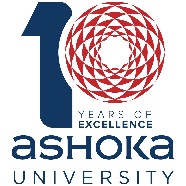Ashoka University Announces Scholarships for All Young India Fellows in Class of 2025-26: Applications Now Open!
New Delhi : Ashoka University, India’s premier interdisciplinary higher education and research institution, today announced that all Fellows selected for the upcoming cohort of the Young India Fellowship (Class of 2025-26) will receive partial or full scholarships. The admissions process opened on October 15, 2024, offering scholarships ranging from 25% to a full 100% waiver covering tuition, residence, and meals along with stipends for additional financial assistance. The prestigious Chancellor’s Merit Scholarship will also continue to be awarded in the Class of 2026.
Currently, 81% of the Young India Fellows are either partially or fully funded with 60% of the cohort benefiting from a full tuition waiver or more. Notably about one-third of the Class of 2025 Fellows identify as first-generation college goers, and 61% as female. With this new initiative, Ashoka University is furthering its commitment to making the Fellowship more accessible to exceptional and deserving individuals coming from all walks of life. The increase in scholarships for the current and next cohort has been made possible primarily through the generous support of HDFC Bank.
“We are glad to be supporting Ashoka’s flagship programme through scholarships, making education more accessible to many deserving students. We wish all success to Young India Fellows.” shared Nusrat Pathan, CSR Head, HDFC Bank.
Reflecting on these developments, Pramath Raj Sinha, Chairperson, Board of Trustees, Ashoka University, said, “The YIF has always been close to my heart, given that it predates the formation of Ashoka University. With increased scholarships thanks to generous contributions by HDFC Bank, we want to truly attract the best and brightest, to experience what this unique programme offers.”
Commenting on the YIF’s future, Somak Raychaudhury, Vice Chancellor, Ashoka University said, “I am greatly enthused and excited about this new chapter where the programme is evolving its mission and funding. I look forward to supporting this ambitious programme and to teaching future generations of Fellows, which continues to be among my most cherished experiences.”
Eligibility Criteria and Selection Process: YIF Class of 2026
The Class of 2026 will comprise around 100 Fellows. Candidates of all age groups and nationalities, across diverse academic, professional, geographical and socioeconomic backgrounds, who have a recognised undergraduate degree in any discipline by July 2025 or earlier (can be a final-year student at the time of application) are eligible to apply for the YIF.
The admissions process opened on October 15, 2024, and is split into two rounds, with the first application deadline being January 5, 2025. Candidates are encouraged to apply early, even within a round, to partake in the rolling personal interviews process.
Aspiring candidates can apply by visiting apply.ashoka.edu.in to register and complete the online application. Following holistic assessment of applications, a number of candidates will be shortlisted for personal interviews. Additionally, some of these shortlisted candidates may be invited to interview for the Chancellor’s Merit Scholarship.
All Fellows who receive an offer of admission are guaranteed a minimum 25% tuition waiver, with some also being awarded the prestigious Chancellor’s Merit Scholarship. All admitted and waitlisted candidates will have the opportunity to apply for need-based Financial Aid, which goes up to a full-waiver on the entire fee along with stipends for additional assistance.
About the YIF, its Mission and Faculty
Instituted in 2011, Ashoka University’s flagship programme, the YIF, offers a year-long residential postgraduate diploma focussed on multidisciplinary and multidimensional learning. Fellows study around 20 courses across various disciplines, work on a real-world project and learn how to think and express effectively, all while being mentored and guided by stalwarts and senior alumni across fields. Over 2300 alumni, across the past 14 years, continue to make an impact across government, civil society, development, academia, research, sports, performing arts, multilateral organizations, the corporate sector, and as entrepreneurs.
Moving forward, the YIF will aim to train Fellows to engage with the most complex and pressing issues of our time. Fellows will learn from various interdisciplinary lenses that will help problem-solve to ultimately co-create a better world. On this journey, they will learn from public intellectuals and expert academics. Currently, these include: K VijayRaghavan (former Principal Scientific Advisor to the Government of India), Arun Kumar Singh (former Indian Ambassador to the United States), Rudrangshu Mukherjee (Chancellor and Professor of History, Ashoka University), Somak Raychaudhary (Vice Chancellor and Professor of Physics, Ashoka University), Dipankar Bhattacharya (Professor of Astrophysics and Head of the Department, Physics, Ashoka University), Sunil Khilnani (Former Director of the King’s India Institute), Mekhala Krishnamurthy (Associate Professor of Sociology and Anthropology, Ashoka University), Pramath Raj Sinha (Chairperson, Board of Trustees, Ashoka University), and Urvashi Butalia (Padma Shri and Founder, Zubaan Books), among others.
The detailed list of courses and faculty at the YIF, along with details of the Class of 2025 Composition, can be found at yif.ashoka.edu.in.
About Ashoka University
Ashoka University is a premier interdisciplinary higher education and research-focused institution, offering world-class opportunities in the natural sciences, social sciences and humanities. Established in 2014 by leaders, thinkers, academics, and philanthropists from diverse fields, it operates on a unique model of collective philanthropy, blending the finest governance practices with cutting-edge pedagogy and an internationally reputed faculty. Today, the University has a community of 3000+ students, and operates with 21 dedicated Centers of Excellence, producing research and interventions for impact in areas such as public health and disease control, energy transition, digitization of society, and women empowerment, among other areas of public policy. The University stands for principles of inclusivity and diversity, having more than 47% women, 4% international scholars, 90+ specially abled students, and over 50% students on financial aid. A non-profit university established under the Haryana Private Universities Act (2006), it is located in Rajiv Gandhi Education City, Sonipat, Haryana, India.

